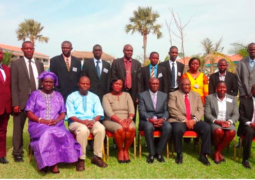The meeting, which will be followed by another meeting of ministers in charge of telecommunications/ICT from ECOWAS member states on 27th September 2013, is among others aimed at bridging the ICT divide within ECOWAS member states.
Thehigh-level ministerial and experts’ meeting underway at the Kairaba Beach Hotel seeks to consolidate the ICT aspirations of ECOWAS member states through a series of measures, notably the proposed termination of taxes on incoming calls to make the ECOWAS region a key player among the global ICT community.
The four-day experts’ meeting, which brought together over 80 international experts, will discuss the implementation status of the ECOWAS 2011-2015 strategic plan for the telecoms/ICT sector, as well as consider the impact of the termination of taxes on incoming calls within member states.
The meeting will also discuss the draft regulation for access to the submarine cables, and adopt the Digital Terrestrial Television (DTT) transmission standard.
Experts will also dilate on the resolution on special reduced rates for telecommunications services on ECOWAS Day (28 May), the West African postal conference and the implementation status of the dot Africa Project.
After intensive deliberations on the strengthening of telecommunications/ICT within the sub-region, the experts on the fourth day of their deliberations will adopt a final report, and prepare the working documents for the ministerial meeting.
The ministerial meeting which will crown the five-day forum is expected to consider the reports and recommendations made by the experts with a view to improve the telecoms/ICT sector within ECOWAS member states.
Speaking at the opening ceremony yesterday, Nana Grey-Johnson, minister of Information and Communication Infrastructure, noted that the telecommunications industry has gone through different stages of metamorphosis over time “as we have moved from the analogue era to the digital revolution.
‘‘These technological developments have blurred the dichotomy between broadcasting, ICTs and telecommunications, thus giving birth to a convergence of technologies and industries,’’ he said.
This, he added, has precipitated the need for adaptive policies, as well as legal and regulatory frameworks to provide the enabling environment for the optimal utility of these opportunities.
According to the minister, the Gambia government through his ministry has enacted the Information and Communication Act 2009 to adapt to these realities.
‘’The Act transposed all the ECOWAS Supplementary Acts adopted at the time, and also assured the emerging information society issues were addressed,’’ he said, adding that his ministry also developed a Strategic Plan for 2010-2014, which considers its infrastructure needs and the enabling environment required to facilitate this transformation.
Nana Grey-Johnson further told experts that the ECOWAS initiative to boost connectivity amongmember states, and to reduce the cost of communications with the sub-region is achievable to some extent with the ACE system.
As a nation, he went on, The Gambia supports the current efforts to remove taxes on international calls between member states, and that could be an important game changer.
Ebou Njie, who represented the president of the ECOWAS Commission, noted that due to its key role in promoting regional socio-economic development, ECOWAS regards the telecommunications/ICT sector among its priorities.


